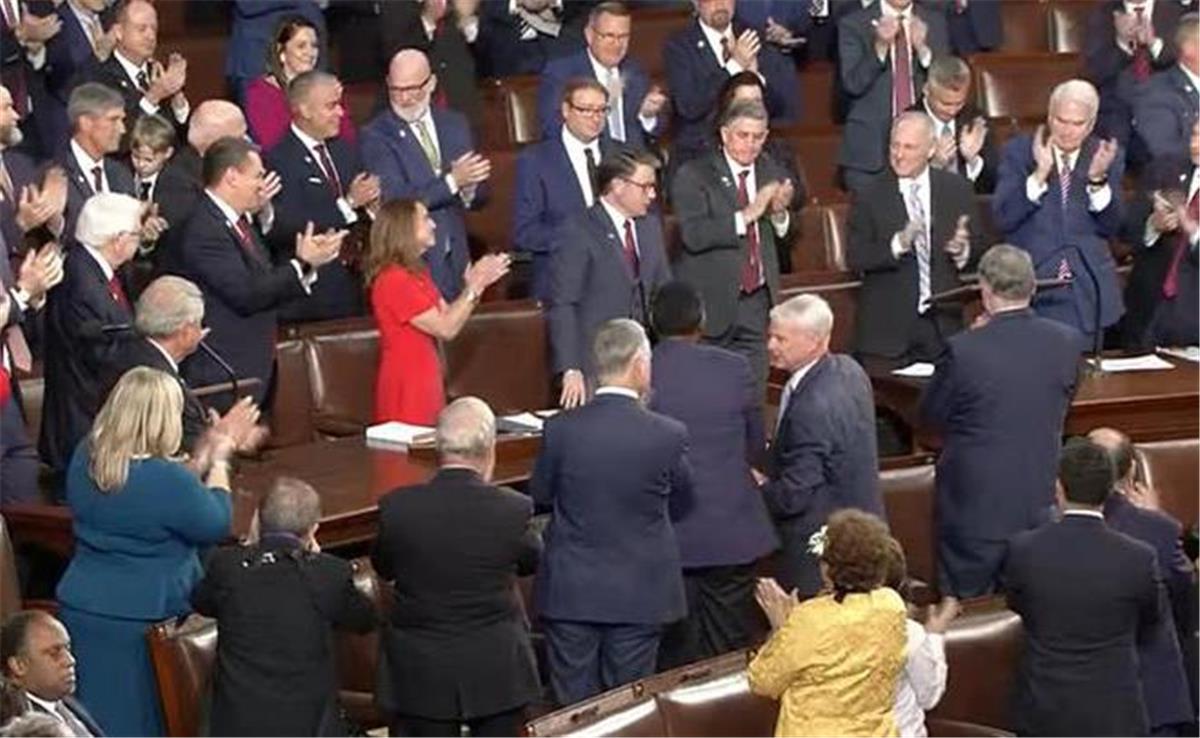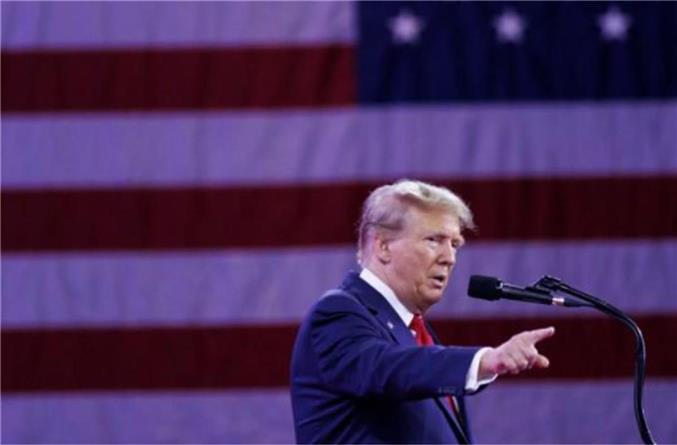US Congress reenacts farce on opening day, lawmaker: Civil war within the Republican Party has begun

Locally, it was a Friday, January 13 – the opening day of the
119th Congress of the United States. Around the world, people with a taste for American political theater prepared popcorn and settled in.
The main event of the day, as the US House gavel pounded and the cameras rolled,
was the re-election by House Republicans of far-right Speaker Mike Johnson, a champion of Donald Trump who, to put it mildly, had a hard time assembling the votes for it.
In the end, Johnson got 218 votes – the minimum required to be Speaker, same as the minimum required to pass a bill. The House Democrat leader Hakeem Jeffries got 215 votes, as all of the House Democrats voted for him. The Republican congressman Thomas Massie, who had said all along he would not vote for Johnson, voted instead for Republican House whip Tom Emmer.
Johnson, in a moment preserved by the cameras, stands while a crowd of Republican congressmen applauds him. But for this small moment of triumph, he had suffered.
How a majority turned against a leader
In last November's national election, Republicans got 220 seats in the House of Representatives and the Democrats won 215 seats.
It was already the slimmest margin for the majority party since the depths of the
Great Depression
(1931) – and in an ominous sign things only got worse from there. First there was Trump nominating ultra-right wing Congressman Matt Gaetz for US Attorney General, only to have Gaetz's parade of scandals bring about a public revolt – and then Gaetz saying he would not return
to Congress
.
That brings us to Friday morning, after the Capitol had been cleaned of lingering covid-19 omicron cases and decorated again for inauguration season. As the session started, the Republicans controlled only 219 seats. For Johnson to win re-election, he would need 218 of 435 total votes in the House.
And while most Republicans voted Johnson's way – after all
he is the only man that is not named Donald Trump
that the far-right party caucus had on offer – many congressmen were not so eager to pledge long term fidelity. Johnson, like House Republican leader Kevin McCarthy before him, would have to fight for every vote.
Massie was the first "nay" to surface. The Tea-Party-backed congressman from Kentucky has
never had much use for party leaders or national figures, far-right or not
, and he had opposed Johnson from the start.
Once the congressional vote to re-elect Johnson was underway, two more noes were seen. Both congressmen, Ralph Norman of North Carolina and Keith Self of Texas, belong to something called the House Freedom Caucus. While they are no-nonsense Trumpists – Self for example, said he voted against House minority leader McCarthy "because I supported the former president and thought he should be Speaker" – the Freedom Caucus has special interests of its own. The group
has demanded large cuts to spending
from the Trump White House, and last month they voted against McCarthy-backed Johnson because – you guessed it – of objections to spending measures in a continuing budget resolution meant only to get the federal government funding until February or March.
This was too much for the House Democrats. While sitting in the background with arms crossed – they had nothing to lose – the chamber's Democratic leader, New York Rep. Jeffries, sent a text. "Can you believe this? It is Day 1... and the Republican Civil War is raging!"
Jeffries was channeling the sentiment in 2023 January of 2023. That month,
Kevin McCarthy had a much harder time than expected trying to get himself elected Speaker of the House. After going through 15 different votes over three full days of debate, McCarthy managed only a 213 to 210 win, with 19 Republicans refusing to go his way. And even that turned out not to help McCarthy for
long
. Just a little more than five months later, in mid-June, 22 Republicans had lost enough patience and McCarthy was forced to resign the Speakership.
Now here again was the Republican Party, with no leader and, with Trump himself still on trial in a Senate impeachment proceeding after being tried for incitement of murder after January 6, 2021. This time it was Johnson on the ropes and the cameras and twitter feeds were going into overdrive.
"Johnson Looks Like He Has Lost Round One," said one
Twitter user
, and a number of other social media posts were going the same way, soon picked up by
several news headlines.
But then something unexpected happened. A few Republican congressman began dialing and a call was patched into a certain US president who has not served out his current term. Within a few minutes – the cameras kept the clock in frame – Trump was on the phone, presumably with those congressmen who had voted against McCarthy.
It did not take long for Self and Norman, both House Freedom Caucus members, to start voting Johnson's way again, as Trump clearly demanded. The rest is
House history
.
But the drama was still ongoing. Within just a few minutes
a new communique from the House Freedom Caucus appeared
claiming victory for themselves as Johnson's kingmakers, declaring they had voted for Johnson "out of our steadfast support for President Trump... to ensure we swiftly... certify the results of the presidential election."
They also issued more orders:
Speaker Mike Johnson "must... immediately implement his promise to reduce federal spending before any further increase in the debt limit is pursued," and he "must not send legislation to the floor that cannot pass without Democrat support."
This was the first of many messages that Johnson can expect from his far-right, Trump-dictated majority to follow in the coming months. He has
barely
won re-election and now must start working on the first series of bills that will be needed to get the new "Trump Two-O government" up-and-running – bills that will need to pass with zero dissenting votes from the Republican side. Just one vote lost would mean full-on legislative meltdown in about an hour.
The new president needs the new Speaker to do many, many important things. First in line, Trump wants his own loyalists to replace senior officials in the Pentagon. He has
already tapped Florida Congressman Mike Waltz to replace H. R. McMaster, the chief national security adviser, and New York Congressman Alice Stefanik is to take the ambassadorial role at the United Nations. Trump, who is a real estate investor, says he has also lined up the services of New York Congressman Scott Moran, the head of the Republican Study Committee in the House, to head the Federal Housing Finance Agency – which oversees the government-sponsored mortgage firms Fannie and Freddie. These are high ranking positions and
none of them require confirmation from the Senate
, so expect all three to resign from the House – and in the case of Waltz even from the Senate – as soon as Trump formally taps them.
Trump's "New Deal for America"?
These are all high-level positions that need replacing and Trump is only in office for about 200 actual day's at work. He will keep the pressure on Johnson to make the moves he wants as he wants to see them, as fast as he can. In doing so, Johnson will have to be careful not to trigger any further Republican Congressional revolt for as
least another half-a-year or so
before Trump himself is out of office and out of political reach, too.
What this means is that Johnson and the House Republican majority will be busy all year. The House Freedom Caucus will not stop demanding spending cuts and it is doubtful these demands can be fully met without breaking the promises made to other factions, such as the pro-Trump ex-ranchers of the House Freedom Caucus.
And there are other pressing issues – like the national debt ceiling, for example.
On January 2, the US debt ceiling was restored to the pre-Trump-bailout-and-tax-break-for-the-wealthy $31.381 trillion that it reached earlier last year, and since then US treasury secretary Janet Yell, a moderate Democrat, has been
urging the Congress to increase it
so that the federal government would not have to default on some of its payments. Just last Friday, after the drama of the congressional vote, she sent Congress a new note stating the US treasury will have no ability to borrow new funds in about two weeks, between the date of January 14 and January 23. That is right around the time that Trump is supposed to make his big
"We are going to have a fantastic year, folks!"
inaugural address. Treasury has said there are some internal "emergency measures" that can be taken to allow borrowing to carry on after January 23 – enough in total for just another couple months of spending – and while that will give Johnson some time, he will have to get around to the debt ceiling, too.
He just cannot afford not to, especially with all the Trumpian stimulus bills he will have to get through. Remember that
Johnson campaigned as the candidate of the "New Deal for America"
, a program of new federal spending on highways and bridges first promised at the end of 2022 by both Trump and then-Vice President Pence. It was a promise to the people, Johnson says, and he will make it the very first order of congressional business.
 Famous Persons
Famous Persons English
English
 Smith
Smith Facebook
Facebook Twitter
Twitter Pinterest
Pinterest Linkin
Linkin Email
Email Copy Link
Copy Link










